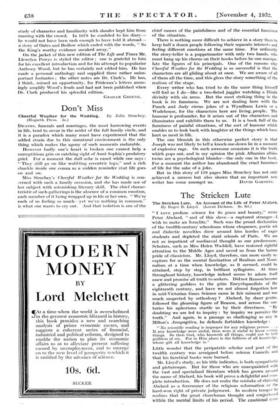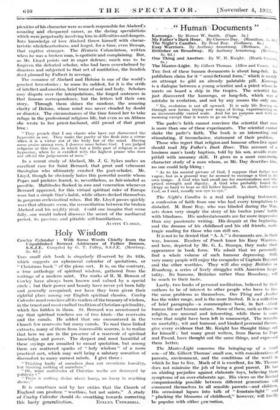The Stricken Lute
"I LOVE profane science for its grace and beauty," wrote Peter Abelard, "and of this slave—a captured stranger—I
wish to make an Israelite." Such was the proud declaration of the twelfth-century; schoolman whose eloquence, poetic wit and dialectic novelties drew around him hordes of eager students and depleted the staid schools of Paris. We are not as impatient of mediaeval thought as our predecessors. Scholars, such as Miss Helen Waddell, have res,tored rightful attention to the Middle Ages and saved us from the barren pride of classicism. Mr. Lloyd, therefore, can more easily re- capture for us the mental fascination of Realism and Nomi- nalism at a time when knowledge, as it seemed, could be attained, step by step, in brilliant syllogisms. At times throughout history, knowledge indeed seems -to adorn itself anew and promise all truth to seekers. Did not Reason become a glittering goddess to the grim Encyclopaedists of the eighteenth century, and have we not almost forgotten how in mid-Victorian times Science came in fair raiment and was much suspected by orthodoxy ? Abelard, by sheer genius, followed the gleaming figure of Reason, and across the cen- turies his aphorisms startle us by their directness. 'By doubting we are led to inquiry : by inquiry we perceive the truth." And again, in a passage as challenging as any in Milton's Areopagitica, he defends forbidden knowledge :
-" No scientific reading is improper for any religious person.. It any knowledge were sinful, then were it sinful to know certain things. So then God, who knoweth all things, could not be held guiltless of sin. For in Him alone is the fullness of all knowledge, whose gift all knowledge is."
Little wonder that the peripatetic scholar and poet of the twelfth century was arraigned before solemn Councils and that his heretical books were burned.
Mr. Lloyd's study, as his title indicates, is both sympathetic
and picturesque. But for those who are unacquainted with the vast and specialized literature which has grown around the name of Abelard, his book will prove a delightful and com- plete introduction. He does not make the mistake of claiming Abelard as a forerunner of the religious reformation or the
hard-won right of private judgement. In modern temper he realizes that the great churchman thought and conjectured within the mental limits of his period. The emotional coin- plexities of his characterwere as much responsible for Ahelard's amazing and chequered career, as the daring speculitioris which were perpetuallyinvolving him in difficulties and dangers. Into knowledge of love Abelard threw. himself ,with charac-
teristic who.leheartedness, and forgot, for a time, even Reason, that captive stranger. The Historia Calamitatum, written
when he was a brokeuman, is egotistic and complaining. But, as Mr. Lloyd points out in eager defence, much was to be forgiven the defeated scholar, who had been overwhelmed by disasters and subjected to that act of mutilation, the fiendish deed planned by Fulbert in revenge.
The romance of Abelard and Heloise is one of the world's greatest love-stories ; to some its saddest, for it is the strife of intellect and emotion, brief truce of soul and body. Scholars may dispute over the interpolations, the forged sentences in that famous correspondence, but the letters tell their own story. Through them shines the candour, the amazing clarity of Heloise, whose mind was never clouded by doubt or disaster. The circumstances of the time forced her to take refuge in the professional religious life, but even as an Abbess she wrote to her priest-husband, still proud of that great love.:
"They preach that I am chaste who have not discovered the hypocrite in me. They make the purity of the flesh into a virtue when it is a virtue not of the body but of the mind. Having some praise among men, I deserve none before God. I am judged religious at this time, in which but a little part of religion is not hypocrisy, when he is extolled with the highest praise who does not offend the judgements of men."
In a recent study of Abelard, Mr. J. G. Sykes makes an excellent case for Saint Bernard, that great and vehement theologian who ultimately crushed the poet-scholar. Mr. Lloyd, though he obviously hates this powerful ascetic whom Popes and prelates feared, is, nevertheless, as fair-minded as possible. Multitudes flocked in awe and veneration whenever Bernard appeared, for this virtual spiritual ruler of Europe wore but a simple friar's habit, while others decked themselves in gorgeous ecclesiastical robes. But Mr. Lloyd passes quickly' over that ultimate scene, the reconciliation between the broken Abelard and his mighty rival. Could one imagine that, scene fully, one would indeed discover the secret of the mediaeval period, its passions and pitiable self-humiliations.
AUSTIN CLARKE.











































 Previous page
Previous page